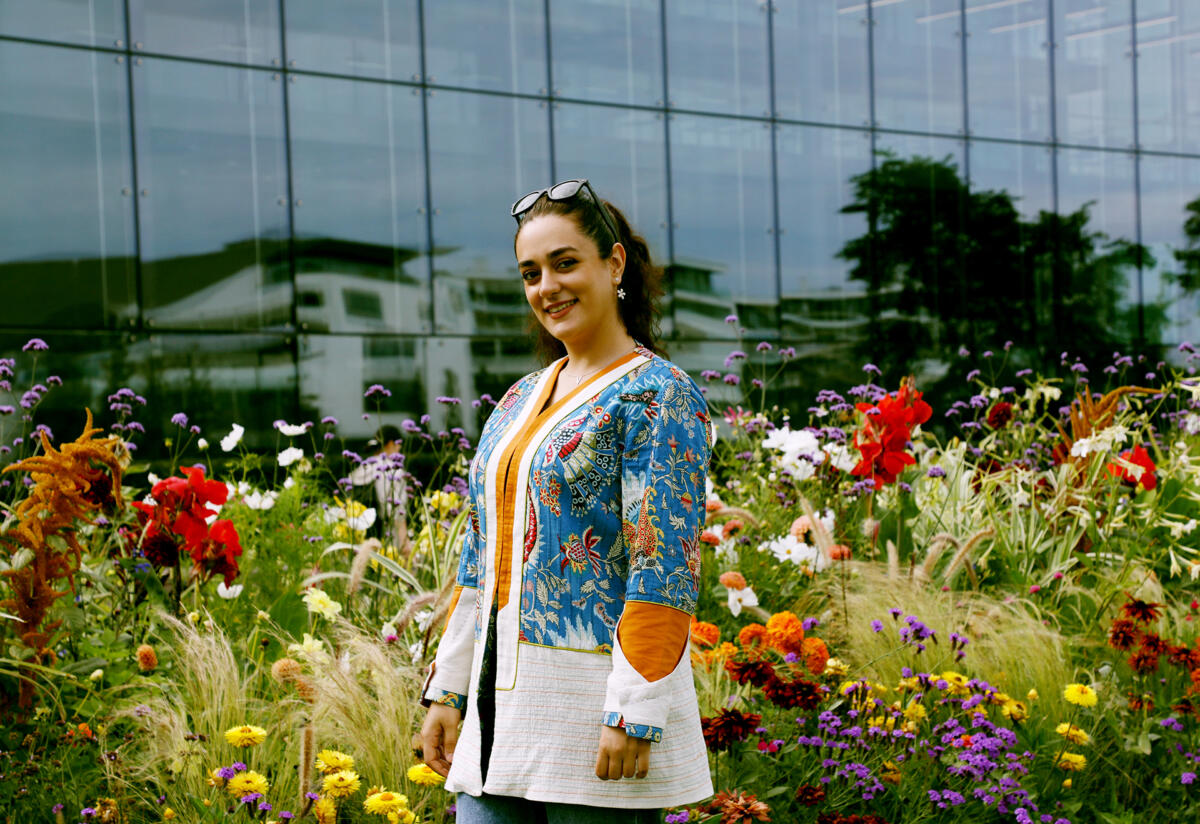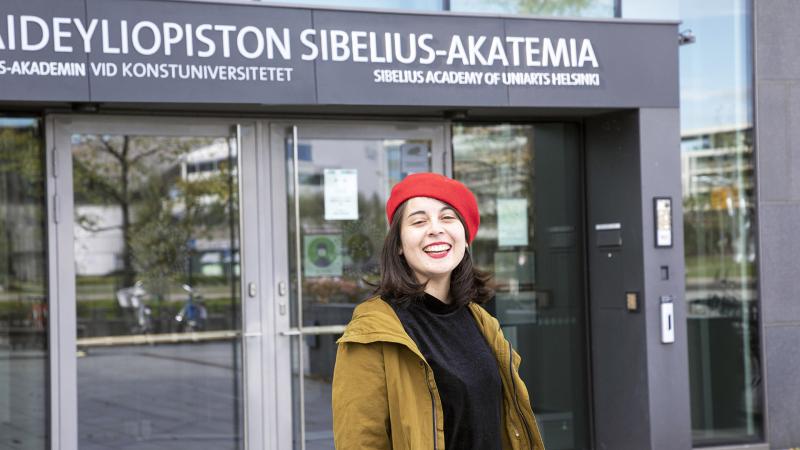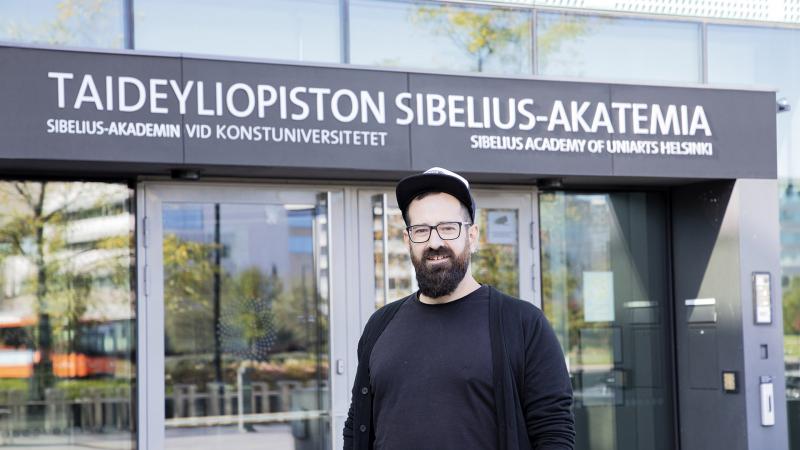Global Music student: An inclusive environment where everyone is encouraged to pursue their interests and passions
Read an interview with musician, composer and santoor player Mehrnoosh Zolfaghari.

What is your motivation for being a musician?
My motivation as a musician stems from a passion for creating and sharing music that has the power to bring people together, convey emotions, and inspire positive change. Music allows me to express myself in ways that words cannot and to connect with people across cultures and languages.
Additionally, I find music therapeutic and a means of self-discovery and personal growth, particularly during challenging times. As a musician, I see myself sharing my culture and tradition with the world while learning from others’ cultural expressions as well.
Why did you choose to study at the Sibelius Academy of Uniarts Helsinki?
I chose to study at the Sibelius Academy because of its Global Music programme. As a musician with a traditional instrument and background from a different culture and nationality, I found the programme to be a wonderful opportunity to explore and learn about the music of different nationalities and traditions and collaborate with other musicians from diverse backgrounds.
The programme allows me to bring my instrument, which may not be known in Finland, and learn about other traditional instruments from different parts of the world. When I learned about this programme, I was immediately interested in applying and becoming a part of the Sibelius Academy community.
What kind of learning environment is the Global Music department for you?
The Global Music department has been a fantastic learning environment for me. I appreciate the diversity of perspectives and experiences among the students and faculty, which has broadened my understanding of music and culture. The department also provides many opportunities for collaboration and performance, which has been invaluable in my development as a musician.
The head of the department has been supportive and attentive to the needs of the students. The teachers have created a welcoming and inclusive environment where everyone feels encouraged to pursue their interests and passions in music. Their mentorship and guidance have been instrumental in helping me achieve my goals as a musician and international student. I recently taught Persian music ensemble as part of my curriculum while teaching at the Sibelius Academy.
In your experience, what kind of wider impacts engaging in intercultural dialogue and collaboration can have on the world around us?
Engaging in intercultural dialogue and collaboration can have a profound impact on the world around us. By sharing our cultural perspectives and musical traditions, we can build bridges of understanding and empathy between different communities. This can help to break down stereotypes and prejudices, and create a more inclusive and connected world.
How are you supported in your own artistic work and advocacy?
As an international student, building a network in a foreign country can be challenging. However, I am grateful for the opportunities provided by the Sibelius Academy to connect with other musicians and industry professionals from diverse backgrounds in school.
While I am fortunate to have a supportive network in my artistic work and advocacy in school, I recognise that building a career in the music industry can be challenging, especially when working within niche genres or traditions.
I believe that the Sibelius Academy can play an important role in helping students connect with industry professionals and find opportunities to showcase their skills and expertise. By providing networking events, mentorship programmes, and career guidance services, the school can help us navigate the music industry and make valuable connections in our respective fields.
I hope that in the future, the school will continue to prioritise these efforts and expand its resources to support students in achieving success in their chosen paths.
What is expected of students?
At the Sibelius Academy, students are expected to work hard and strive for learning new skills in their musical education. This includes regular practice and preparation, as well as participation in classes, ensembles, and other musical activities. Students are also encouraged to take an active role in their own learning and development, and to engage with the wider musical community through performance and collaboration.
What has surprised you during your studies?
One thing that has surprised me during my studies is the extent to which music is intertwined with cultures and societies. Through my classes and interactions with fellow students and faculty, I have come to appreciate the many ways in which music reflects and shapes our collective experiences and identities.
What’s your experience of studying in Helsinki?
Studying in Helsinki has been an exciting experience for me. The city offers abundant and diverse opportunities to attend concerts and performances across a wide range of genres. Additionally, I have enjoyed the natural beauty of Helsinki both in the summer and winter seasons.
Helsinki is a safe and pleasant city that provides ample opportunities for students to discover the local culture and community.
What kind of advice would you give to other students who are considering applying to the Sibelius Academy?
My advice would be to prepare thoroughly and demonstrate a strong commitment to music and learning. It is also important to be open to new perspectives and experiences, and to take advantage of the many opportunities for collaboration and performance that the school offers. Finally, I would encourage students to be proactive and to take an active role in their own artistic development.
Who
Mehrnoosh Zolfaghari is a highly accomplished musician, composer, and santoor player based in Finland. With over 20 years of experience playing the traditional Persian dulcimer, she has established herself as a respected figure in the world of music.
Currently, she is pursuing her second master’s degree at the Global Music department at Sibelius Academy, with a focus on promoting Iranian music and its unique cultural heritage to a wider audience around the globe. She is deeply passionate about blending traditional sounds with contemporary influences, creating a unique sound that is both authentic and innovative.
Mehrnoosh received both her bachelor’s and master’s degrees in music performance from the University of Tehran, College of Fine Arts, where she was recognised as the class valedictorian. Her early musical education and concentration were on Persian traditional music, but in recent years, she has also explored modern contemporary music, leading to numerous projects and compositions that merge electronic sounds into santoor.
Throughout her career, Mehrnoosh has collaborated with many outstanding professors, including Joachim Heintz, Sergio Castrillón, Adriano Adewale, and Bijan Kamkar. She has also won numerous prestigious national and international awards in both contemporary and traditional music, including the Gilgamesh International Composition Competition in the USA, Reza Korourian’s Composition Competition, and the first round of the Aref National Award in Iran.
Furthermore, Mehrnoosh has compiled an extensive list of publications, including albums, singles, and books during her musical journey.
Mehrnoosh’s expertise and passion have led her to work on several exciting projects, including collaborations with other musicians, transcultural approaches to arranging music, and blending traditional Persian sounds with contemporary electronic music. She strives to be a true ambassador for Persian music, dedicating herself to creating and sharing innovative compositions that showcase the beauty and depth of this rich musical tradition with audiences around the world.
She is an active composer and performer, collaborating with the musicians of their band “Zemiene quartet” on transcultural approaches to arranging music. Together, they are also set to release an EP in 2023.

